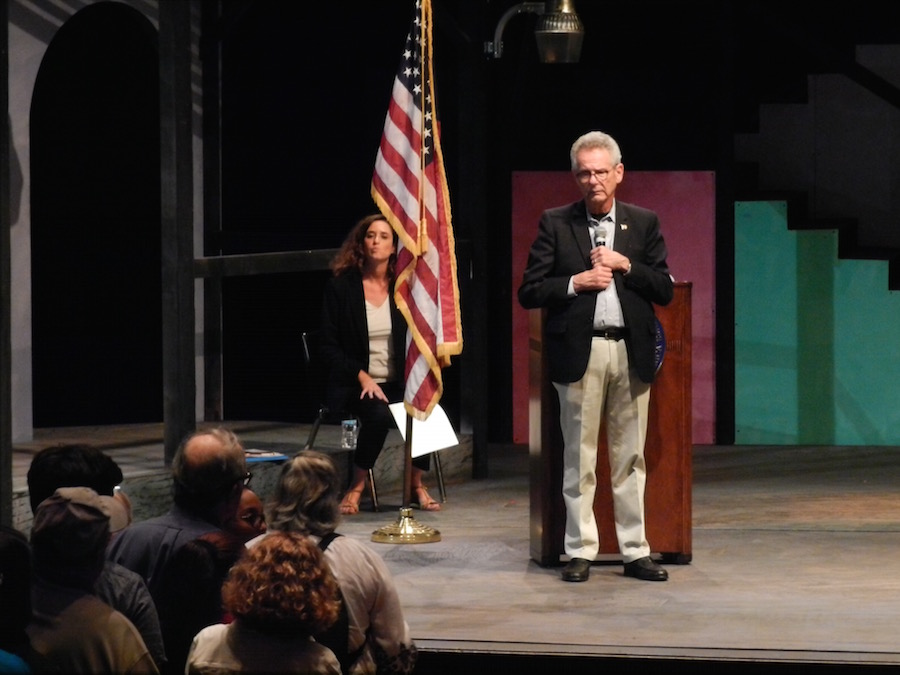
Congressman Alan Lowenthal takes questions from attendees of a town hall hosted at Long Beach City College. Photos: Jason Ruiz
There were several moments Monday night where Congressman Alan Lowenthal heeded to the raucous crowd that packed an auditorium on the Liberal Arts Campus of Long Beach City College. Instead of battling through the noise, Lowenthal patiently waited, microphone in hand, for the roar to subside to finish his points during his first large-scale town hall event, one that drew nearly 900 people.
The noise, however, was much different than that experienced by some of his Republican colleagues across the country in recent weeks which have led to more viral confrontations with their constituents. There were no chants of “Do your job” or threats of him being voted out of office in next year’s midterm elections.
Instead, Lowenthal, who represents Long Beach and a host of other West Orange County cities, received mostly adulation from the progressive-friendly crowd that packed the building last night. As one woman simply shouted—over the interjections of a heckler—“we’re with you.”
The event, “A Conversation About America,” deviated from the congressman’s preferred method of meeting with constituents in smaller, more intimate settings like coffee shops. Lowenthal ditched that tradition for the larger venue due in part to the large numbers of concerns his office has heard regarding actions taken by President Donald Trump’s administration during his first 100 days in office.
Like the rest of the nation, last night’s discussion centered on the Affordable Care Act and the Republican efforts in Congress to repeal and replace it.
Tthe American Health Care Act, or Trump Care as Democrats have cast it, was projected yesterday by the Congressional Budget Office to reduce the number of insured persons in this country by 24 million over the next decade, undoing progress made under Obamacare—it insured 20 million more Americans mostly through the expansion of Medicaid—and raising premiums on those that were helped financially under Obamacare.
Lowenthal did not shy away from acknowledging that the current system has flaws, but like most in attendance, he did not advocate for it to be ripped up and thrown away. Instead, he said he and his Democratic colleagues would continue efforts to amend it and block the proposal coming from the other side of the aisle.
“When I was in the state legislature I thought that the best way to move forward was a single-payer system,” Lowenthal said. “And we hopefully will get there, but I’ll tell you that the Affordable Care Act has been a godsend to people who can now go to the doctor with their family with dignity to be treated just like anybody else. These are working families, working people who could not afford insurance.”
Much of the anxiety in the room revolved around what the repeal could mean for attendees and their families. One woman who works for a healthcare provider in Orange County framed her issue with the ACA repeal by pointing to the number of jobs that could be lost.
“We stand to lose fifteen thousand jobs in Orange County alone if the ACA goes away,” said Cheryl Sanchez-Simmons, a Long Beach woman who works for CalOptima in Orange County. “It’s a concern. I would really like to see if we could come to a compromise with the GOP and keep some of these ACA benefits that are out there for everyone.”

The town hall packed an auditorium at LBCC’s Liberal Arts Campus near its capacity of over 900 people.
Lowenthal said his colleagues are open to discussing the matter with Republicans but that any kind of bipartisan agreement would have to meet three criteria: The new law must cover the same people it currently covers, it can’t cost those people currently receiving coverage any more money and there can’t be a reduction in the types of services provided.
Another woman asked Lowenthal that if the Democrats in Congress are not able to block the bill they should ensure that it, along with its projected cuts, goes into action immediately, not in 2020 after many of those who are advocating for it are elected back to their positions.
“We’ll try,” Lowenthal said during a moment of levity.
A group of three men holding Trump yard signs and intermittently drawing attention to themselves briefly detracted from the town hall’s otherwise orderly production. Once he got to the microphone, a man wearing a red Make America Great Again hat unveiled his list of demands which included a mandatory death penalty for undocumented persons who kill American minors.
He also asked Lowenthal what he would say to states or cities who will be defunded by the federal government for harboring undocumented persons under sanctuary policies.
“I began earlier today saying how proud I was of Long Beach Community College, of Long Beach State University and our city for saying we are an inclusionary city. And we’re going to stand behind them,” Lowenthal said garnering a large round of applause.
While the focus for many was the healthcare system and how changes to it could affect them personally, Lowenthal fielded questions on other topics like gun control, the environment and higher education.
A high school student asked the congressman what kind of efforts are being made to ensure that higher education is more affordable for the American people. Lowenthal pointed to former President of the University of California Clark Kerr, a Republican, who introduced a master plan for the UC system in the 1960s that included free tuition. The congressman said it proved that such a concept was not so radical, and that it was something he hopes the country can get back to.
“Of all the things that Bernie Sanders talked about I think that’s what touched me the most, that higher education has to be free,” Lowenthal said. “We have to return to that.”
Speaking to one woman’s concern about a bill aiming to dismantle the Environmental Protection Agency, Lowenthal said it most likely will not pass, however, it could be “a death by a thousand cuts.” The thousand cuts being a proposal to drastically cut the agency’s budget by about a quarter and reduce its staff by about 3,000, according to a report by the Washington Post.
He said that some Republicans, especially those in areas being hardest hit by climate change (South Florida, Louisiana, parts of the East Coast) are coming to grips with the fact that climate change is a losing political item.
Lowenthal pointed to a California Republican colleague, Rep. Darrell Issa, a longtime climate change denier who joined the Climate Change Solutions caucus this month. The caucus is a bipartisan body within Congress that is focused on developing climate change policies to combat evolving weather patterns.
That last bit played into a larger narrative that Lowenthal bestowed on the crowd in terms of what they can do to affect change. Since the Republicans enjoy margins in both the House of Representatives (237-193 with five vacancies) and the United States Senate (52-48), Lowenthal and his colleagues see putting pressure on those in power and the 2018 mid-term elections as powerful bargaining chips.
He noted that Senator Tom Cotton, a Republican from Arkansas, voted to repeal Obamacare nearly every time it was put up for a vote while he was a member of the House of Representatives. However, Cotton has now become one of the more vocal critics of the American Healthcare Act as his state stands to become one of those most affected by a contraction of the Obamacare Medicaid expansions.
“Cotton heard story after story of people in his district who are not rabble rousers, they’re just people in his district that said ‘we can’t get along without this act” and he has dramatically changed,” Lowenthal said. “And I think that’s the message. You’ve got to go to people and let them hear your stories. Then, we will see great change. And as I say, if it doesn’t happen and you get involved…2018 is around the corner.”

